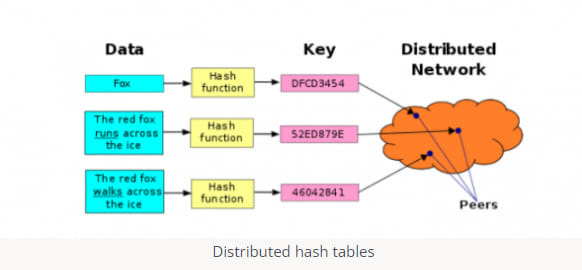Maintaining Immutable Data Integrity with Blockchain Storage Protocol IPFS
By Sameer Danave, senior director of marketing, MSys Technologies
This is a Press Release edited by StorageNewsletter.com on May 16, 2024 at 2:00 pm By Sameer Danave, a seasoned technology marketing professional with 16 years of full-stack marketing experience and senior director of marketing at MSys Technologies LLC.
By Sameer Danave, a seasoned technology marketing professional with 16 years of full-stack marketing experience and senior director of marketing at MSys Technologies LLC.
Maintaining Immutable Data Integrity
with Blockchain Storage Protocol IPFS
With the increasing reliance on digital information across various sectors, ensuring the immutability of data has become a critical concern. Traditional centralized storage systems, while effective to some extent, are vulnerable to tampering and manipulation. As a result, there has been a growing interest in decentralized storage solutions, particularly those leveraging blockchain technology.
One such protocol gaining prominence is the InterPlanetary File System (IPFS), which offers a decentralized approach to storing and accessing data. In this article, we’ll delve into the concept of maintaining immutable data integrity with blockchain storage protocols like IPFS, exploring their mechanisms, benefits, and real-world applications.
Understanding Immutable Data Integrity
At its core, immutable data integrity refers to the assurance that once data is stored, it cannot be altered or tampered with. This is essential for ensuring the trustworthiness and reliability of digital information, particularly in applications where data integrity is critical, such as financial transactions, healthcare records, and legal documents. Traditional storage systems rely on centralized servers to store and manage data, making them vulnerable to various security threats, including hacking, data breaches, and unauthorized access. In contrast, blockchain storage protocols provide a decentralized approach. Data is distributed across multiple nodes removing single points of failure.
Role of Blockchain in Data Integrity
Blockchain technology, renowned for its role as the foundational framework supporting cryptocurrencies such as Bitcoin and Ethereum, has become a potent solution for safeguarding data integrity. Essentially, a blockchain operates as a decentralized and distributed ledger, documenting transactions across a network of computers. Every transaction, or block, is securely linked to its predecessor using cryptographic techniques, forming an immutable chain. This inherent characteristic ensures that data stored on the blockchain remains unalterable and resistant to tampering, establishing a reliable mechanism for upholding data integrity.
Introducing the InterPlanetary File System (IPFS)
It operates as a decentralized protocol aimed at establishing a peer-to-peer network tailored for storing and exchanging hypermedia via a distributed file system. In contrast to conventional centralized storage setups, where data is confined to specific servers, IPFS relies on an interconnected web of nodes for storage and dissemination. Every data fragment is allocated a distinct cryptographic hash, serving as its distinctive identifier. Upon file requisition, the IPFS protocol identifies and retrieves the file according to its hash, ensuring streamlined and decentralized data accessibility.

Benefits of IPFS for Immutable Data Integrity:
- Decentralization: By distributing data across a network of nodes, it eliminates single points of failure, reducing the risk of data loss or tampering.
- Content Addressing: Each piece of data on IPFS is identified by a unique content identifier (CID), derived from its cryptographic hash. This ensures that data remains immutable and tamper-proof, as any changes to the data would result in a different CID.
- Data Redundancy: It employs a technique called content-addressable storage, where duplicate copies of data are automatically discarded. This ensures optimal storage efficiency while maintaining data redundancy for fault tolerance.
- Censorship Resistance: Since IPFS operates as a decentralized network, it is inherently resistant to censorship and tampering. This makes it for applications where data integrity and accessibility are paramount.
Real-World Applications of IPFS
It has a range of real-world applications across various industries:
- Content Distribution: It can be used to distribute and share content in a decentralized manner, making it for content delivery networks (CDNs), peer-to-peer file sharing, and decentralized social media platforms.
- Data Archiving and Preservation: It can be used to create immutable archives of digital content, such as historical documents, scientific research papers, and cultural artifacts, ensuring their long-term preservation and accessibility.
- Supply Chain Management: It can be leveraged to create transparent and tamper-proof supply chain networks, ensuring traceability and authenticity.
- Decentralized Finance (DeFi): It can be used to store and distribute financial data, such as transaction records, smart contracts, and decentralized applications (DApps), ensuring transparency and security.
In conclusion, maintaining immutable data integrity is essential for ensuring the trustworthiness and reliability of digital information. Blockchain storage protocols like IPFS offer a decentralized approach to storage and access, providing robust mechanisms for ensuring data integrity. By leveraging IPFS, organizations can create tamper-proof and censorship-resistant storage solutions, enabling secure and transparent access to data across various applications and industries. The role of protocols like IPFS in maintaining immutable data integrity will become increasingly significant, shaping the future of digital storage and data management.
I have also gathered all the information you need on the latest storage and data center trends straight from industry experts and MSys’ survey of 400+ technology professionals and crafted a Tech Lens 2024 guide.









 Subscribe to our free daily newsletter
Subscribe to our free daily newsletter

